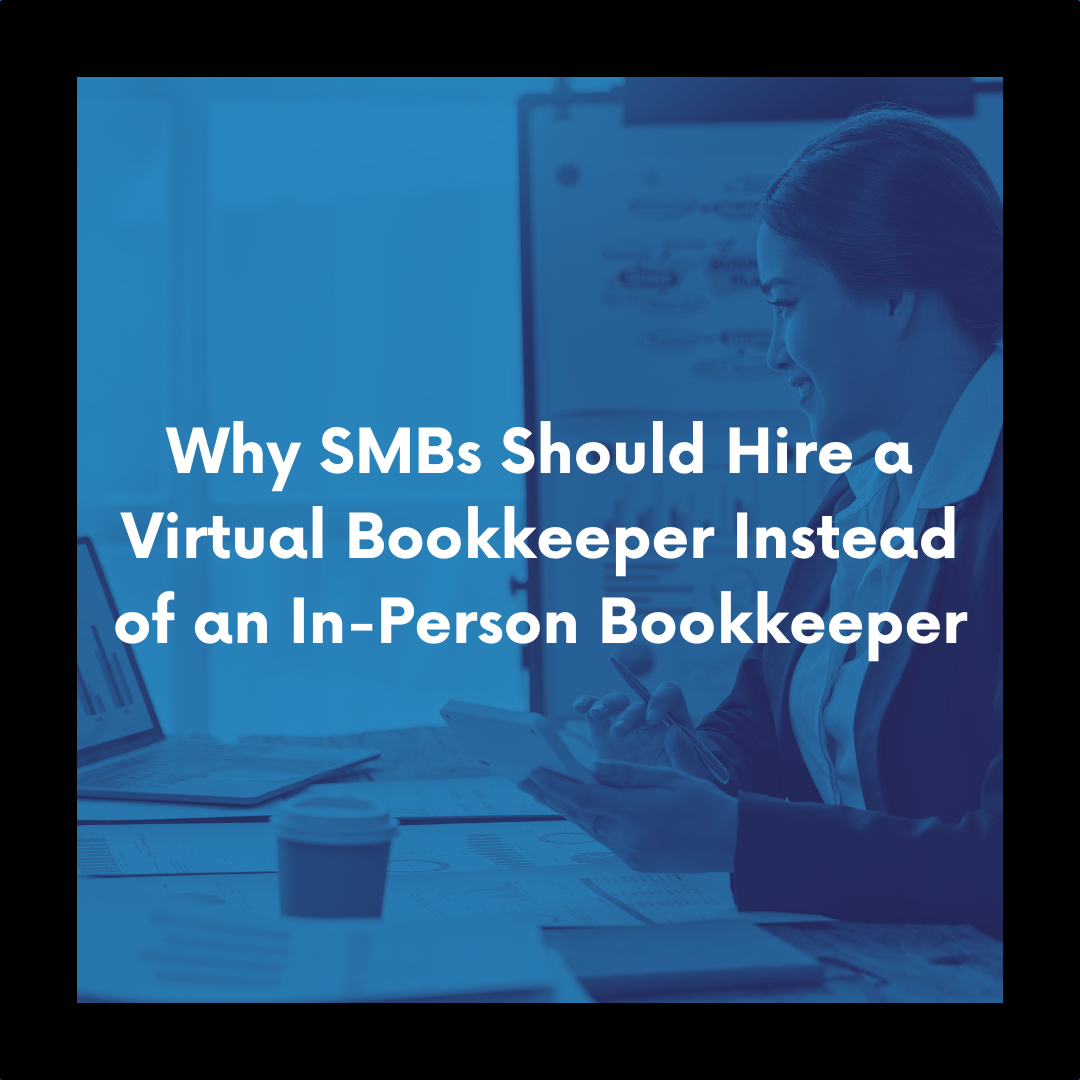Why SMBs Should Hire a Virtual Bookkeeper Instead of an In-Person Bookkeeper
Managing business finances is a big responsibility, and bookkeeping plays a crucial role in keeping everything organized. For small and medium-sized businesses (SMBs), choosing between hiring an in-person bookkeeper or a virtual bookkeeper can make a significant impact on efficiency and cost. A virtual bookkeeper offers flexibility, affordability, and better access to financial data, making them the smarter choice for modern businesses.

Cost Savings: Virtual Bookkeepers Reduce Expenses
Every small business owner looks for ways to cut unnecessary costs. Hiring a full-time, in-person bookkeeper comes with extra expenses, including salary, benefits, office space, and equipment. These costs can quickly add up, especially for businesses with a tight budget.
A virtual bookkeeper allows you to pay only for the services you need. Many offer hourly rates, project-based pricing, or monthly packages, helping you manage finances without committing to a full-time employee. Additionally, most virtual bookkeepers use advanced bookkeeping software, eliminating the need for businesses to invest in expensive tools.
📌 Compare virtual bookkeeping services at Bench or QuickBooks Live.
Access to Skilled Bookkeepers from Anywhere
Hiring an in-person bookkeeper limits your options to local talent, which may not always be the best fit for your business. If your area has a shortage of experienced bookkeepers, you might have to settle for someone with less expertise.
A virtual bookkeeper allows you to work with highly skilled professionals, no matter where they are located. You can find specialists in different industries, whether it’s e-commerce, healthcare, or real estate. With a wider talent pool, you get better bookkeeping support without being restricted by location.
📌 Find experienced virtual bookkeepers on Upwork or Xero Advisors.

Scalability: A Flexible Solution for Growing Businesses
Many SMBs experience fluctuating financial needs throughout the year. An in-person bookkeeper may not always be able to keep up, and hiring additional staff can be expensive.
Virtual bookkeeping offers the flexibility to scale services up or down as needed. During tax season or busy sales periods, you can increase bookkeeping support. If business slows down, you can reduce the level of service without the complications of hiring or firing employees. This flexibility makes virtual bookkeeping ideal for businesses with changing needs.
Real-Time Access to Financial Data
Keeping track of financial records in real-time helps businesses make informed decisions. An in-person bookkeeper typically works set business hours, which can delay access to financial reports.
Virtual bookkeepers use cloud-based software like QuickBooks Online, Xero, or FreshBooks. These platforms allow business owners to check financial reports, track expenses, and monitor cash flow at any time. Whether you’re at the office or traveling, your financial data is always accessible.
📌 Learn more about cloud-based bookkeeping at Xero.
Enhanced Security and Fraud Prevention
Some business owners assume having an in-person bookkeeper provides better financial security, but it can increase the risk of fraud if there is limited oversight. A single employee handling all financial transactions without regular monitoring can be a liability.
Virtual bookkeeping services use secure accounting software with built-in audit trails, making it easier to track transactions and prevent unauthorized activity. Multi-user access allows business owners to monitor financial data while keeping records protected with encryption and other security measures.
📌 Learn how to secure financial records with this guide from FreshBooks.
Improved Efficiency Through Automation
Traditional bookkeeping methods, such as manual data entry and paper-based record-keeping, are time-consuming and prone to errors.
Virtual bookkeeping services use automation to streamline bank reconciliations, expense tracking, invoicing, and reporting. Automated processes reduce the risk of human error, speed up financial tasks, and ensure bookkeeping records are always up to date.
No Need for Additional Office Space
Hiring an in-person bookkeeper requires desk space, a computer, and office supplies. For businesses with limited office space, this can be an unnecessary hassle.
A virtual bookkeeper works remotely, eliminating the need for extra office accommodations. Businesses get the benefits of professional bookkeeping without the added cost of expanding their workspace.
Final Thoughts: The Smart Choice for SMBs
Virtual bookkeeping offers a cost-effective, flexible, and efficient way for small and medium-sized businesses to manage their financial records. With lower expenses, access to skilled professionals, and cloud-based bookkeeping solutions, businesses can stay financially organized without the commitment of hiring an in-house bookkeeper.
If you’re ready to streamline bookkeeping and improve financial efficiency, hiring a virtual bookkeeper is the best way forward.
📌 Explore top-rated virtual bookkeeping services at Bench or QuickBooks Live.
📌 Looking for a trusted virtual bookkeeper? Contact me at m.bol@mrm-bookkeeping for personalized bookkeeping services tailored to your business needs. 🚀

